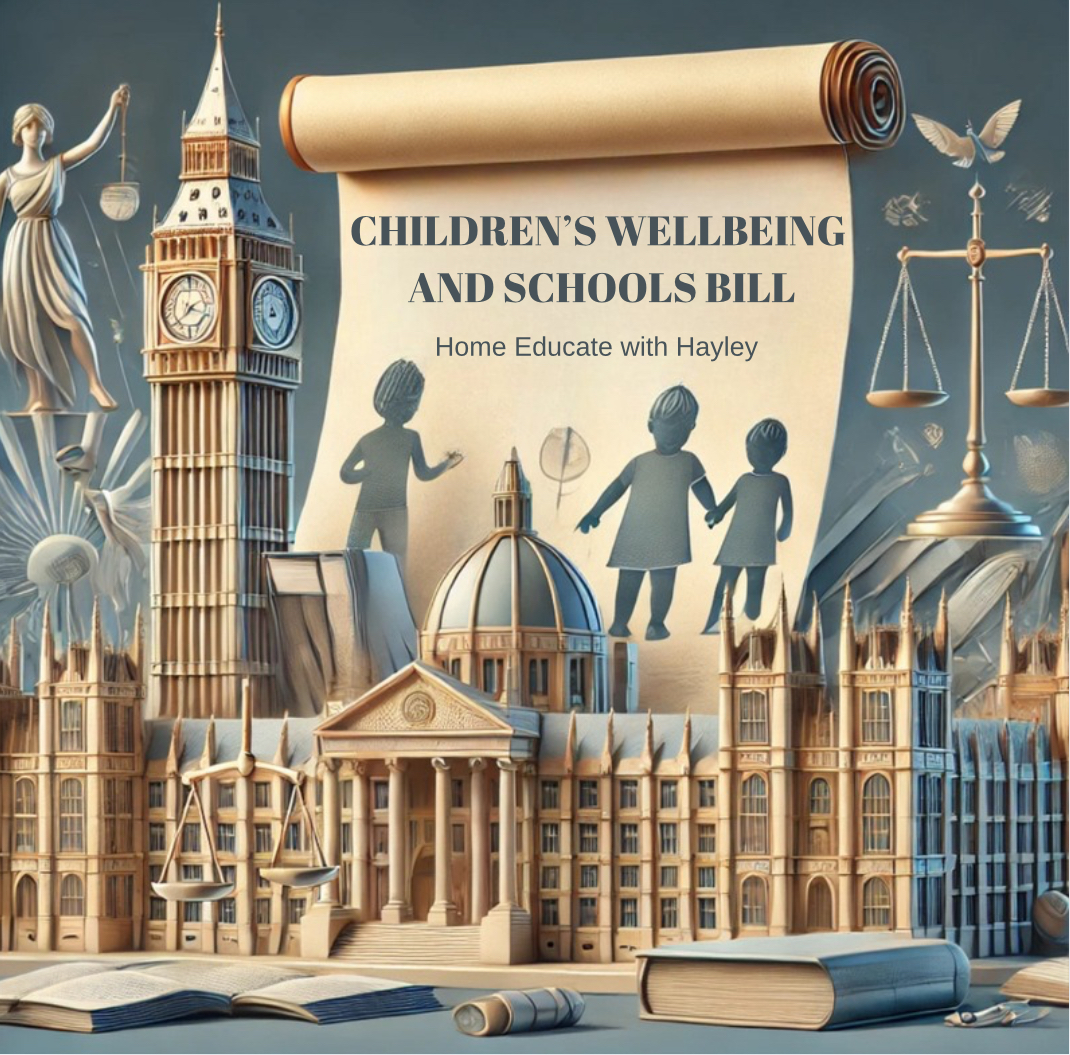The introduction of the new Children’s Wellbeing and Schools Bill has sparked significant concern among the home educating community in England. On the surface, the bill appears to focus on improving children’s welfare, but upon closer examination, its provisions raise serious issues for home educators. Below, I’ll outline why this bill is deeply problematic and why it warrants opposition from families who have chosen home education as a legitimate and valued path for their children’s learning and development.

1. Erosion of Parental Rights
The bill proposes increased government oversight into home education, shifting the balance of responsibility for children’s education and welfare from parents to the government. Under current laws, parents are legally responsible for ensuring their children receive a suitable education, whether at school or otherwise. The proposed measures could undermine this, treating home educating families as inherently suspect and reducing parents’ autonomy in deciding what is best for their children.
Parents, not the government, are the primary educators of their children. Forcing families to comply with rigid bureaucratic standards erases the flexibility and individuality that makes home education so effective for many children.
2. Mandatory Registration and Monitoring
One of the key provisions of the bill is the introduction of mandatory registration for home educated children, alongside regular monitoring visits. While supporters argue this ensures all children are accounted for, the reality is that it assumes families are guilty of neglect or poor practice until proven otherwise.
Monitoring can disproportionately target families who are already meeting or exceeding educational and wellbeing standards. Moreover, there is no evidence to suggest that the majority of home educating families fail to provide a suitable education. These measures could instead divert valuable resources away from children genuinely at risk of harm or neglect.
3. Vague Definitions of ‘Suitable Education’ and ‘Wellbeing’
The bill fails to provide clear definitions for critical terms like “suitable education” and “wellbeing,” leaving them open to interpretation by local authorities. This creates a significant risk of arbitrary or inconsistent decision making, with families potentially penalised for not adhering to narrow, school-based criteria.
Home education often follows a personalised approach, with children learning at their own pace and in ways that suit their individual needs. Enforcing rigid assessments risks disregarding the diversity of educational methods and the positive outcomes they achieve.
4. Increased Burden on Local Authorities
Local authorities are already struggling with limited resources. Imposing additional responsibilities for monitoring home educated children could stretch them further, compromising their ability to focus on safeguarding children who genuinely need intervention. Home educating families may face unnecessary scrutiny while vulnerable children slip through the cracks due to overwhelmed systems.
5. Creating Barriers to Home Education
For many families, the introduction of this bill may make home education seem unfeasible due to the intrusive oversight and increased bureaucracy. This could disproportionately affect marginalised communities, who may lack the time or resources to comply with stringent requirements, or who fear unfair treatment. The result? Families may feel pressured to send their children to school, even if it isn’t the best choice for their needs.
6. Ignoring the Benefits of Home Education
The bill overlooks the proven benefits of home education. Research shows that home educated children often excel academically, socially, and emotionally, with flexible learning environments enabling them to thrive. Many parents choose home education because traditional schools cannot meet their children’s specific needs, whether due to special educational needs, bullying, or a desire to nurture a passion for learning outside the constraints of the national curriculum.
By prioritising government control over parental choice, the bill risks dismantling these benefits without addressing the root causes of issues in education and child welfare.

7. Potential Bias Against Lower-Income Families
The bill could exacerbate inequalities by introducing biased judgments against lower-income families. Wealthier parents may be perceived as providing better opportunities simply because they can afford additional resources, tutors, or extracurricular activities. Meanwhile, families with fewer financial means might face heightened scrutiny or assumptions of inadequacy, even if they are providing an excellent education tailored to their children’s needs.
This creates a two-tier system where families from marginalised or less affluent backgrounds could be unfairly penalised or discouraged from pursuing home education. By introducing these measures, the children’s wellbeing bill risks turning what should be a level playing field into one where socioeconomic status becomes a factor in determining whether a family is “suitable” to home educate.
8. Impact on Children with Special Educational Needs and Disabilities (SEND)
The proposed bill could disproportionately affect families with children who have special educational needs and disabilities (SEND). Many families choose home education precisely because traditional schools cannot provide the tailored support their children need. The flexibility and personalised approach of home education allow these children to thrive in ways that mainstream education often cannot accommodate.
The bill’s emphasis on rigid monitoring and narrow definitions of “suitable education” risks forcing these families to conform to inappropriate standards, which may not reflect their children’s unique learning needs. Local authorities may lack the expertise to properly assess or support home educated SEND children, leading to unfair judgments and undue stress on families already managing significant challenges.
By ignoring the specific needs of SEND families, the bill will inadvertently harm the very children it claims to protect.
9. Undermining Trust Between Families and Local Authorities
The proposed bill risks eroding the already delicate relationship between home educators and local authorities. Many families who currently engage positively with their local councils may feel alienated by the increased scrutiny and assumption of incompetence embedded in the bill’s framework.
Mandatory monitoring and registration could create an adversarial dynamic, where home educating parents feel they must constantly prove their worth or risk intervention. This shift from collaboration to enforcement may discourage families from seeking support or sharing their educational journeys openly, ultimately harming both parents and children.
A system that promotes partnership and understanding would be far more effective in ensuring children’s welfare than one based on suspicion and heavy-handed oversight.
10. Failure to Address the Root Causes of Educational Issues
The bill appears to target home educators as a solution to perceived gaps in safeguarding and education standards, but it does little to address the systemic issues within the broader education system. Many families turn to home education because mainstream schools are failing to meet their children’s needs—whether due to underfunding, inadequate support for SEND students, bullying, or a lack of flexibility in the curriculum.
By focusing on increased regulation for home educators, the bill diverts attention and resources away from solving these root problems. This risks placing undue pressure on home educating families while failing to improve outcomes for the majority of children in the education system.
11. Violation of Fundamental Human Rights
One of the most concerning aspects of the Children’s Wellbeing Bill is its potential to infringe upon our basic human rights. Under the Human Rights Act 1998, Article 8 protects the right to private and family life, which includes the ability for parents to make decisions about their children’s upbringing, such as how they are educated. By imposing intrusive monitoring and rigid regulations, the bill risks overstepping these boundaries, granting the state unwarranted authority over family life. (If you would like a separate blog detailing more of the ways the Bill infringes on the human rights act please let me know in the comments)
A Call to Action for Home Educators

Home educators across England must unite in opposing this bill to protect their rights and those of their children. Here’s how you can make your voice heard:
- Engage with Your MP: Write to your Member of Parliament, expressing your concerns about the bill and its potential impact on your family and others in the home education community. You can find your MP using the UK Parliament website https://members.parliament.uk/FindYourMP
- Join Advocacy Groups: Organisations like Education Otherwise and Educational Freedom are already campaigning against this bill. Join them to stay informed and take collective action.
- Educate Others: Use social media, blogs, and community networks to raise awareness about the implications of the bill. Encourage others to stand with you in defense of parental rights and educational freedom. Writing opinion pieces, engaging on social media, or organising community discussions can help build wider awareness and opposition.
- Respond to Consultations: When the government holds a consultation on the bill, ensure your voice is heard by submitting detailed responses highlighting its flaws.
- Attend Protests and Events: Public demonstrations can be powerful tools for showing the strength and solidarity of the home education community.
Yes, those who oppose the Children’s Wellbeing and Schools Bill can take several steps to express their views and engage with the legislative process: - Committee Members: Opponents of the bill can write to MPs serving on the Public Bill Committee, as they are responsible for scrutinising the bill.
You need to contact the MPs scrutinising the bill before the Public Bill Committee’s deadline for reporting back, which is currently scheduled for February 11, 2025. However, it is advisable to send your letters or evidence as soon as possible, as the committee may make key decisions earlier in the process.
Details on how to submit evidence can be found on the UK Parliament website. - Use Petitions: Create or sign petitions to demonstrate public opposition. For example, petitions on the UK Government and parliament petitions website with significant support may prompt a debate in Parliament.
Final Thoughts
The Children’s Wellbeing and schools Bill, while to some would be considered well intentioned, is a threat to the autonomy and effectiveness of home education in England. By imposing unnecessary oversight, vague standards, and burdensome bureaucracy, it risks undermining the very principles that make home education a valuable alternative to traditional schooling.
Home educators must stand firm in opposition to the Children’s wellbeing bill, not only for their own families but for future generations who deserve the right to learn in a way that best meets their needs. Together, we can ensure that parental rights, educational diversity, and children’s wellbeing remain protected.
Let’s act now to safeguard the future of home education.
Further reading:
If you are yet to read the Bill then you can view it here https://bills.parliament.uk/bills/3909
I highly recommend keeping up to date with https://educationalfreedom.org.uk and https://www.educationotherwise.org for up to date and in depth information on the bill.
I have summarised the Children’s wellbeing bill without any legal jargon in a previous blog https://homeeducatewithhayley.com/?p=417
Thank you so much for sharing this Hayley! I will share and encourage others to take action to support ourselves as parents and our children!